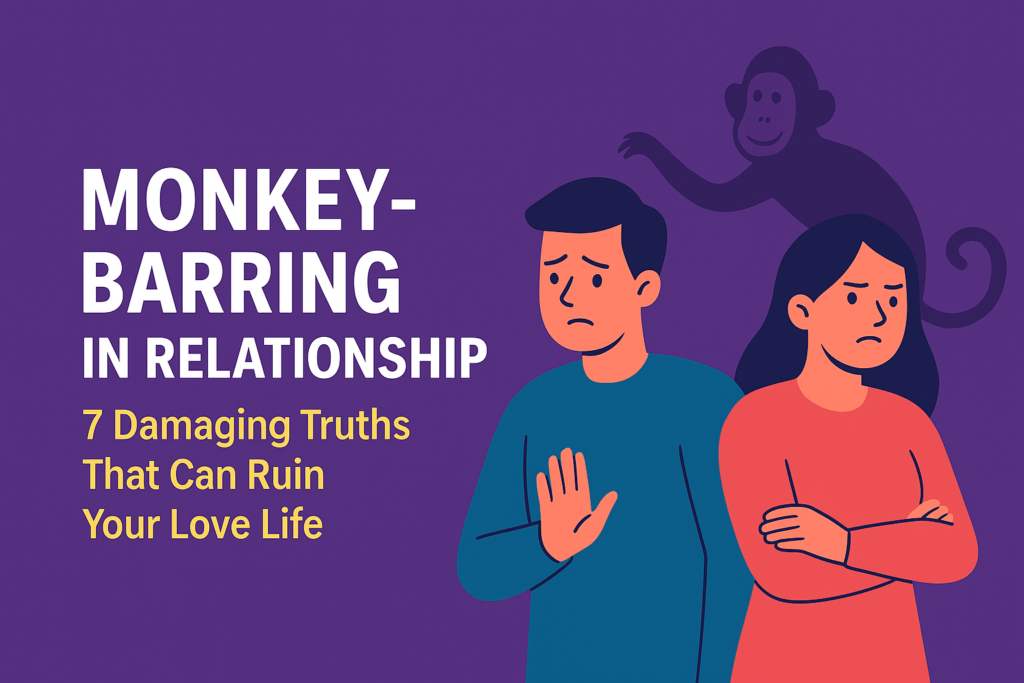
7 Damaging Truths About Monkey-Barring in Relationship That Can Ruin Your Love Life
Monkey-Barring in Relationship: The Hidden Struggle You Need to Understand
Relationships can be nurturing, healing, and fulfilling, but they can also reflect our deepest fears and insecurities. One of the less-discussed yet powerful patterns in modern dating psychology is monkey-barring in relationship. This term describes the tendency of some people to hold on to one partner until they secure another, much like a monkey swinging from one branch to the next without letting go. While it may seem subtle, this behavior can have damaging effects on trust, commitment, and emotional well-being.
What is Monkey-Barring in Relationship?
At its core, monkey-barring in relationship means someone doesn’t leave their current partner until they are sure they have another one waiting. Instead of facing the discomfort of being alone, they “swing” into the next relationship as a safety net.
This behavior is often rooted in fear of loneliness, low self-worth, and dependency issues. It prevents authentic connections and creates a cycle of insecurity and mistrust.
Psychological Roots of Monkey-Barring in Relationship
Understanding why people fall into this pattern is crucial. Several psychological factors play a role:
- Fear of abandonment – The individual feels unsafe being alone, leading them to constantly seek backup partners.
- Low self-esteem – When someone doesn’t value themselves, they might rely on external validation from multiple sources.
- Attachment style – People with anxious or avoidant attachment may find it difficult to fully commit, leading to unhealthy coping behaviors.
- Childhood trauma – Early experiences of neglect, rejection, or inconsistent love can shape adult relationship patterns.
Signs of Monkey-Barring in Relationship
Recognizing the signs helps both partners understand what is happening:
- Partner seems emotionally detached while still in the relationship.
- Flirtation or hidden communication with potential future partners.
- Lack of effort in resolving current relationship conflicts.
- Sudden, quick transition into a new relationship after a breakup.
- Justification of disloyalty with phrases like “I didn’t want to be alone.”
Emotional Impact of Monkey-Barring in Relationship
This behavior doesn’t just affect the person doing it—it deeply impacts their partner as well:
- For the partner being left: feelings of betrayal, insecurity, and rejection. They may question their self-worth and feel they were “replaced” too easily.
- For the person engaging in monkey-barring: they miss opportunities for growth, healing, and self-reflection between relationships. The cycle continues without resolution.
Ultimately, monkey-barring damages the foundation of intimacy, as true closeness requires vulnerability and trust.
Why Monkey-Barring in Relationship is Harmful
Many people think this pattern is harmless because it avoids loneliness. In reality, it comes with consequences:
- Shallow connections – Relationships become about convenience, not emotional depth.
- Unresolved trauma – Old wounds remain unhealed, carried into the next relationship.
- Loss of trust – Future partners may sense the lack of commitment and feel unsafe.
- Dependency trap – The person never learns to find strength and security within themselves.
How to Heal From Monkey-Barring in Relationship
Breaking free from this cycle requires courage and self-awareness. Some helpful steps include:
- Accepting solitude – Learning that being single is not a failure but an opportunity to grow.
- Therapy and counseling – Working with a professional can uncover childhood wounds and fears that drive this behavior.
- Building self-esteem – Engaging in self-care, hobbies, and personal achievements helps create a sense of worth outside relationships.
- Practicing emotional honesty – Being transparent with oneself and partners about needs and fears.
- Creating secure attachment – Over time, healthier patterns can replace fear-driven ones.
Monkey-Barring in Relationship and Emotional Maturity
True maturity in relationships is about standing on your own and choosing a partner out of love, not fear. When someone learns to let go without needing an immediate replacement, they open themselves to more authentic and lasting connections.
Healthy relationships are built on choice—not dependency. Breaking away from monkey-barring allows individuals to form bonds based on trust, emotional safety, and mutual growth.
Role of Society in Monkey-Barring in Relationship
Social and cultural factors also influence this pattern. Many societies stigmatize being single, especially as people age. The pressure to always be in a relationship may unconsciously encourage monkey-barring.
Additionally, social media amplifies the problem. With constant access to potential partners online, it becomes easier for individuals to seek validation and backup relationships instead of committing fully to one person.
Final Thoughts on Monkey-Barring in Relationship
Monkey-barring in relationship may not always be intentional, but it leaves behind broken trust, emotional confusion, and a lack of personal growth. For those who recognize this behavior in themselves, it’s not too late to break the cycle. With self-reflection, therapy, and courage to embrace solitude, a healthier path can emerge.
For partners who have experienced the pain of being on the receiving end, healing requires self-compassion, setting boundaries, and choosing relationships that align with emotional safety.
Ultimately, love thrives when both partners choose each other without fear or dependency. By understanding the hidden struggle of monkey-barring, we can all work toward healthier, more fulfilling connections.

Understanding the damaging truths behind monkey-barring is the first step toward healthier love.
GOOGLE REVIEWS
Couples struggle when one partner keeps holding onto the next option.
